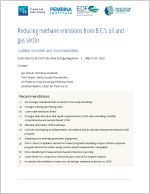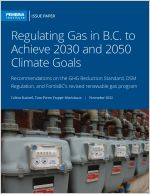
This letter contains the Pembina Institute’s comments to the Canadian Environmental Assessment Agency on an analysis of the anticipated carbon emissions associated with the Woodfibre LNG project in Squamish, B.C.
The Pembina Institute acknowledges that Woodfibre LNG has taken measures to limit emissions at their proposed LNG terminal. Nevertheless, the overall impact of the project would still be larger than necessary because of untapped opportunities to reduce emissions from the associated upstream gas. Therefore, gaps in the policy framework need to be closed and existing policies need to be strengthened.
For B.C., the project's annual carbon emissions would represent 2% of the 2030 target recommended by the Climate Leadership Team, and 7% of the province's legislated 2050 target. That being said, the analysis by Environment and Climate Change Canada (which used the Pembina Institute's B.C. Shale Scenario Tool as one data source) likely underestimates methane emissions.
On a broader level, our letter points out that the development of any LNG projects will make producing credible plans to meet Canada's and B.C.'s emissions targets much more challenging.


